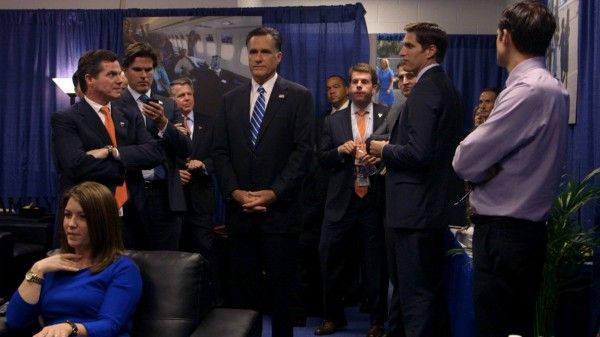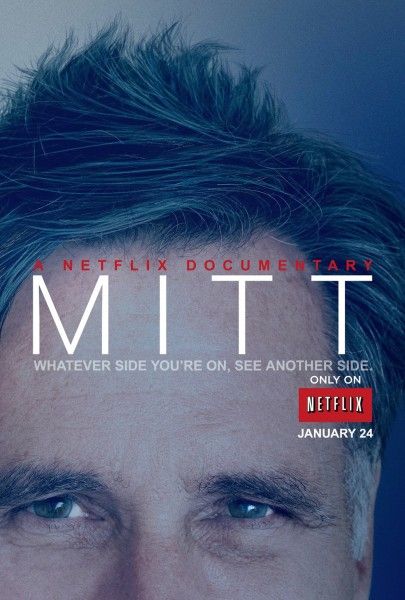I’ve been thinking about Mitt Romney throughout this nightmarish Presidential election season. I didn’t vote for Romney in 2012, and I don’t think he would have been a good President for a majority of the country, but I have no doubt that he would be mopping the floor with Hillary Clinton if he were the GOP’s nominee in 2016. Instead, the majority of Republican voters chose to go with a rancid, misogynistic, racist, deplorable fear-monger who has never held elected office in his life.
It’s easy to conflate feelings about a candidate with feelings about a party. After all, that candidate becomes that party’s standard-bearer. Thinking about how much I despise Donald Trump and everything he represents, I felt the need to go back to Greg Whiteley’s 2014 documentary Mitt (currently available on Netflix), which goes behind the scenes of Romney’s 2008 and 2012 presidential campaigns.
The thing to know about Mitt is that it’s not trying to paint a complex, multidimensional portrait of Romney. Oddly, it wants to divorce the politician from the man even though the man is a politician. We know Mitt Romney’s name because he’s a politician, not because he’s a good husband and father. And yet Whiteley’s approach makes some semblance of sense because of all the resentment that builds up over the course of a Presidential campaign. The nature of politics isn’t just to say, “Well, my candidate has ideas that fit my goals better than the other guy.” The nature of politics is to demonize the other guy.
Mitt works to remove the demonization, and while it doesn’t try to portray Romney as a complex individual, it instead asks a simple question: Even if you disagree with Mitt Romney’s policies, could you still like him as an individual? If you cut out most of the political stuff, and just show him as a humble guy who loves his family and sometimes has issues with the political process, can you relate to this guy who was born wealthy and whose policies would support the wealthy at the cost of the lower and middle-class?
To its credit, Mitt doesn’t play like a campaign ad, but it comes awfully close. In fact, had the film been released during the 2012 election, it probably would have boosted Romney’s favorability rating by showing him as a normal guy. The criticism made by Mitt is that we don’t get to see behind the curtain in Presidential campaigns, and if we did, we might see a decent person. Of course, as the Trump Tape from last week shows, sometimes when you peek behind the curtain, the guy is as awful as you expected him to be.
What’s refreshing about Mitt is that at its best moments, it feels like it’s healing a divide. It’s incredibly easy to make fun of Romney for stuff like “Binders full of women,” and it’s kind of easy to loathe him for his 47% moment (a moment the film notes, but it never explores the fallout). And yet overall, does anyone, today or back in 2012, really hate Mitt Romney? There are plenty of criticisms you can lob at him, but he’s not a loathsome person.
In one of the movie’s best moments, Romney talks to his family about a small business that has to give up 65% of their income to taxes. He rattles off all the different taxes they have to pay, and while I never agree with Romney’s viewpoint, I feel like you can at least have an honest disagreement on those points without painting him as a villain. We can disagree about what’s best for small businesses without making our opponent out to be a monster.
The problem with Mitt is that it’s too flattering. I saw the movie when it came out in 2014 and then I watched it again this past weekend, and while it goes to great lengths to humanize Romney, it’s not making the argument that politicians can be good people. It’s making the argument that people are good when you strip away politics. And yet if there’s to be an honest accounting for Mitt Romney, we can’t just divorce him from his politics or his political machinations. He’s more than just a performance at a debate or frustration at being labeled “the flipping Mormon.”
Because here’s the truth about Mitt Romney: Mitt Romney sought Donald Trump’s endorsement in 2012. This was when Trump was stoking the fires of the birther movement and arguing that our first black president was illegitimate. It was racist and Romney’s political calculus didn’t care. The Romney depicted in Mitt is just a guy who thinks that Barack Obama is leading us down the wrong path and it takes a businessman like himself to help America’s businesses. That’s respectful disagreement. What’s not respectful is seeking the endorsement of a swamp monster who thinks that the American President isn’t an American.
In Mitt, we see that it’s nice for Romney to recognize that he comes from privileged background, but there’s no exploration of how that privileged background divorced him from the needs of poor people. Romney believes that because his father picked himself up by the bootstraps, then other people should be able to as well, which is a lot like saying “This person won the lottery; why doesn’t everyone buy lottery tickets?” That’s not to say that George Romney didn’t work hard, but it’s naïve to believe that America is a meritocracy. Furthermore, the America of today is drastically different than the one where George Romney was able to succeed, and while Mitt may find his father’s story inspiring, it’s ridiculous to believe we live under those same conditions. There are plenty of people who work themselves to the bone every day and they will never be anywhere near as rich as Mitt Romney or his father because there’s a system in place to keep them poor.
I don’t think Romney is vindictive about that system. Even his 47% comment doesn’t come off as mean-spirited. But the lesson we should take from Mitt and any nostalgia we might have for Romney or John McCain or other GOP nominees during this election season is that policies matter. Is it nice that the Romney campaign didn’t churn our stomachs like the Trump campaign is doing now? Sure, but being nice isn’t the same as being good.





